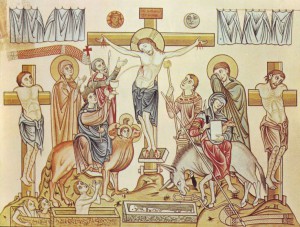“Therefore, nevertheless, those weak with devotion look at the humanity of Christ, in which they recognize the cause of their own salvation: They stand near the cross of Christ, and with Thomas put their own hand into the place of the nails and most devoutly they received the blood, which was shed for the washing away of sins. Therefore, let everyone come to the cross of the Lord, who, alarmed in conscience, stands guilty before God.”*
In this sermon for Palm Sunday, Absalom of Springiersbach focused on the nature of the cross in the Christian life. Absalom belonged to the Victorines, a organization of regular canons with profound influence in the twelfth and early thirteenth centuries. This text demonstrates two significant teachings in twelfth-century spirituality. First, the Incarnation and Passion of Christ appeal to humanity’s physicality to lead sinners away from mere carnal desires to spiritual affections. Second, biblical characters’ response to the crucifixion of Christ exemplify various forms of response to the Passion.
In this quote Absalom describes the spiritually weak and the means by which Christ comes to them. The spiritually mature have ascended beyond the crutch of Christ’s physicality to the virtues of faith and love in God. Bernard of Clairvaux famously described this idea in the following manner:
“The soul at prayer should have before it a sacred image of the God-man, in his birth or infancy or as he was teaching, or dying, or rising, or ascending. Whatever form it takes this image must bind the soul with the love of virtue and expel carnal vices, eliminate temptations and quiet desires. I think this is the principal reason why the invisible God willed to be seen in the flesh and to converse with men as a man. He wanted to recapture the affections of carnal men who were unable to love in any other way, by first drawing them to salutary love of his own humanity, and then gradually to raise them to spiritual love.”**
*Absalom of Springiersbach, Sermo 24. Palm Sunday, PL 211: 145 [my translation]
**Bernard of Clairvaux, Sermon 20, On the Song of Songs I, trans. Kilian Walsh (Kalamazoo: Cistercian, 1971), p. 152.

